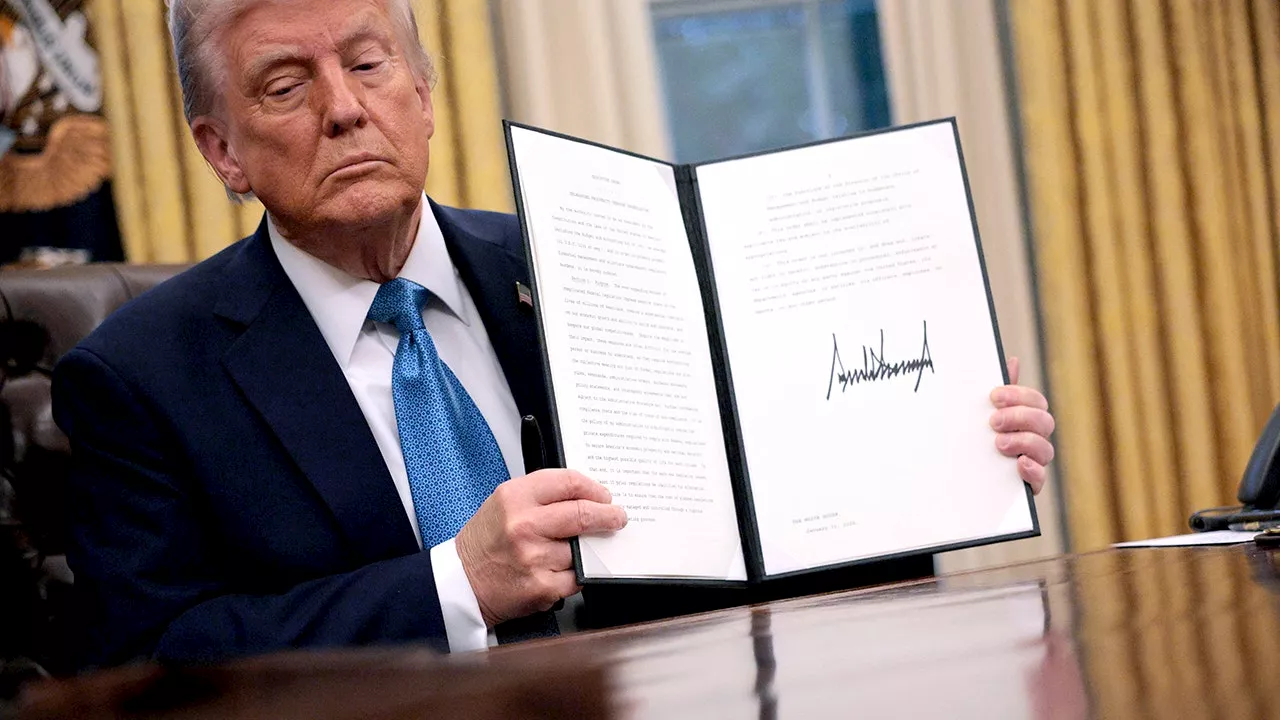President Trump's proposed tariffs on Mexico and Canada, while temporarily delayed, could lead to increased prices for consumers on various goods and services. Experts warn that food, energy, and auto industries are particularly vulnerable to price increases. The potential implementation of these tariffs raises concerns about inflation and its impact on household budgets.
President Donald Trump's announcement of tariffs on Mexico and Canada , though delayed for at least one month, could spur a rise in prices paid by consumers for products affected by the tariffs if they're eventually implemented. Trump announced last weekend that 25% tariffs, which are taxes on imported products, would take effect on products from Canada and Mexico effective Feb. 4 – as well as a lower 10% tariff on Canadian energy products.
Canada and Mexico threatened retaliatory tariffs in response to Trump's tariff plans. The president reached an agreement with Canada and Mexico to delay the tariffs for at least one month after the two countries announced measures to counter fentanyl smuggling and illegal immigration across the U.S. border. While the tariffs on Canada and Mexico are on hold for the time being, their potential implementation in the future leaves open the possibility that American consumers could face higher prices for certain products if they ultimately take effect. Dan Savickas, VP of policy and government affairs at the Taxpayers Protection Alliance, told FOX Business, 'Assuming in the next month or so the tariffs on Mexico and Canada do go into effect, you'll see prices go higher on a lot of goods.' Scott Lincicome, VP of general economics and trade policy at the Cato Institute, said in an interview with FOX Business that the 'three big areas for potential consumer pain would be food, energy and autos.' 'On food, we import a ton of fresh seasonal produce as well as beer… meat and a few other things from Mexico,' he explained. 'These are perishable items that you can't stockpile and in the case of avocados, there aren't really suitable replacements whether in the U.S. or abroad. Given that grocers in the U.S. have very low profit margins, you would inevitably see any sort of tariff on, say, Mexican avocados just passed right on to the consumer – there's nowhere else for it to go.'Lincicome explained that the auto industry is more complex, with suppliers and produce in the U.S., Canada and Mexico comprising the North American auto supply chain. 'You apply tariffs on these things and you're effectively ensuring some sort of substantial cost increase for automotive manufacturers in all three countries and then the question is how much of that gets passed on,' Lincicome explained. 'Depending on whom you talk to, it's anywhere between $1,000 and $6,000 on a new car and again, there's some amount of that that manufacturers can absorb – of course, with less investment and hiring and output in the process.' 'We import so much crude oil from Canada and it's a type of crude oil that we don't really make in the U.S., it's a heavy crude. Certain refineries, particularly in the Midwest and the Mountain West, are designed to process that type of crude and they can't really process the light crude that the U.S. makes cheaply or easily,' he explained. Lincicome added that there would likely be some price increases on appliances like washing machines, dishwashers and air conditioners that are made in the three countries. Other products that Savickas noted could see price increases due to the tariffs include lumber and associated products given the volume of Canadian lumber imported by the U.S., as well as tomato products from Mexico. Brandon Parsons, an economist at Pepperdine University's Graziadio Business School, told FOX Business that his research suggested the consumer price index (CPI), a popular inflation gauge, could rise by 1.3 percentage points if tariffs are implemented. Given that CPI was 2.9% in December, it could push inflation above 4% – a level which is double the Federal Reserve's target. Parsons said that for the average household, that 1.3% increase in the CPI would likely increase expenses by about $1,000 and those expenses could rise relatively quickly in some cases. 'Assuming that these tariffs go through in a month, I would expect prices on groceries to go up relatively soon,' Parsons explained. 'Certain products like an avocado, it could be a couple of weeks possibly, maybe even sooner in other cases.
ECONOMY TARIFFS MEXICO CANADA CONSUMERS INFLATION FOOD ENERGY AUTOMOTIVE
United States Latest News, United States Headlines
Similar News:You can also read news stories similar to this one that we have collected from other news sources.
 Trump Tariffs LIVE: President Will Impose 25% Tariffs on Mexico and Canada TomorrowPresident Donald Trump is planning to impose 25% tariffs on imports from Canada and Mexico starting tomorrow. Follow Newsweek's live blog for updates.
Trump Tariffs LIVE: President Will Impose 25% Tariffs on Mexico and Canada TomorrowPresident Donald Trump is planning to impose 25% tariffs on imports from Canada and Mexico starting tomorrow. Follow Newsweek's live blog for updates.
Read more »
 Trump's Tariffs on China Spark Retaliation, Mexico-Canada Tariffs DelayedPresident Trump imposed tariffs on Chinese goods, triggering immediate retaliatory measures from China. Tariffs on Mexico and Canada have been temporarily postponed to allow for further trade and border security talks.
Trump's Tariffs on China Spark Retaliation, Mexico-Canada Tariffs DelayedPresident Trump imposed tariffs on Chinese goods, triggering immediate retaliatory measures from China. Tariffs on Mexico and Canada have been temporarily postponed to allow for further trade and border security talks.
Read more »
 Trump's tariffs could cause US layoffs, experts say. Here are the jobs at riskPresident Donald Trump has proposed 25% tariffs on Canada and Mexico, and 10% tariffs on China.
Trump's tariffs could cause US layoffs, experts say. Here are the jobs at riskPresident Donald Trump has proposed 25% tariffs on Canada and Mexico, and 10% tariffs on China.
Read more »
 Trump's tariffs threaten job losses, experts say. These may be the hardest hitTrump has proposed 25% tariffs on Canada and Mexico, and 10% tariffs on China.
Trump's tariffs threaten job losses, experts say. These may be the hardest hitTrump has proposed 25% tariffs on Canada and Mexico, and 10% tariffs on China.
Read more »
 Canada Threatens Retaliatory Tariffs on US Goods if Trump Imposes 25% TariffsCanada is considering retaliatory tariffs on American products if President-elect Donald Trump follows through on his threat to impose 25% tariffs on all Canadian goods.
Canada Threatens Retaliatory Tariffs on US Goods if Trump Imposes 25% TariffsCanada is considering retaliatory tariffs on American products if President-elect Donald Trump follows through on his threat to impose 25% tariffs on all Canadian goods.
Read more »
 Mexico Imposes Retaliatory Tariffs on US After Trump TariffsMexico has responded to President Trump's 25% tariff on the country by imposing its own retaliatory tariffs. President Claudia Sheinbaum Pardo criticized Trump's actions and accused him of ignoring the root causes of the fentanyl crisis in the US. While Mexican products will face a 25% tariff, Chinese goods will be subject to a 10% tariff. The US will also impose 10% tariffs on energy products from Canada.
Mexico Imposes Retaliatory Tariffs on US After Trump TariffsMexico has responded to President Trump's 25% tariff on the country by imposing its own retaliatory tariffs. President Claudia Sheinbaum Pardo criticized Trump's actions and accused him of ignoring the root causes of the fentanyl crisis in the US. While Mexican products will face a 25% tariff, Chinese goods will be subject to a 10% tariff. The US will also impose 10% tariffs on energy products from Canada.
Read more »
